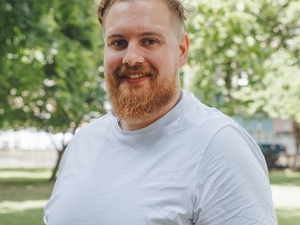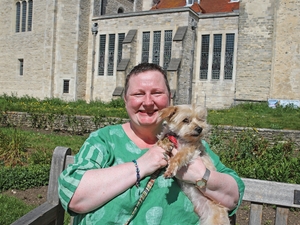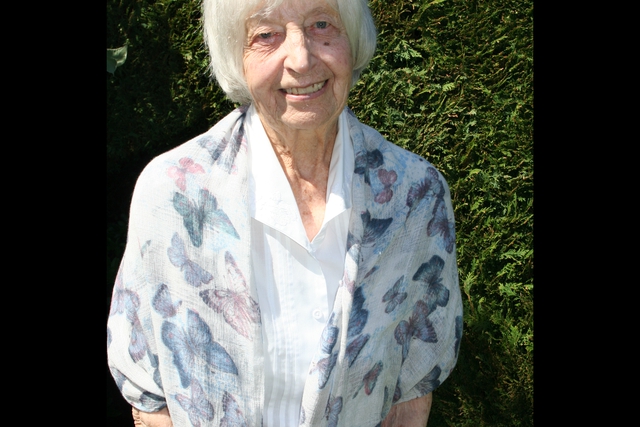-

30 June 2025
Our oldest priest marks 50 years since ordination
The Rev Alan Ball, who is aged 99, was among those in our cathedral for ... read more
-

19 June 2025
Backstage man steps into the limelight
Perennial backstage man Nathan Hamilton will step out into the spotlight once he is ordained ... read more
-

10 June 2025
Bishop’s daughter is among those being ordained
The daughter of a former Bishop of Portsmouth is among 28 people who will be ... read more
'I want Christians to be reconciled'

HER book aims to help reconcile Christians who disagree on some of the most controversial issues around today.
Monica Ditmas, from St Mary’s Church, Buriton, has written a book that aims to bridge the gaps between Christians and promote unity.
The 88-year-old used to be warden of our Diocesan Retreat House, welcoming groups from parishes, deaneries and youth groups for prayer, teaching and worship. It was here she had a revelation about the importance of reconciliation.
“I’ve only recently become aware that I’ve been involved ever since with helping others with inner reconciliation,” she said. “I’ve just realised how subtly I was being prepared to write this book. I started to sort out some of the talks I’d given and the quiet days I’d led and found, to my surprise, how often they brought in this question of reconciliation, inner and outer.”
Looking back, Monica can see how God has led her to this point. She enjoyed a happy childhood in ramblingrectories in Shropshire and Herefordshire, as her father was a priest.
By the age of 10 she felt she knew everything about Jesus, andwas able to answer all the questions in Sunday School. But it wasn’t until her 20s that she realised – she knew everything about Jesus, but didn’t know Jesus personally.
“When you don’t have a relationship with God, you don’t realise that you don’t know him,” she said. “What you don’t have, you don’t miss. The difficult times in my life have shown how crucial that relationship is.”
Monica studied history at Bristol University. Her teaching career was deferred through marriage in 1946 and the birth of her two children. She then worked at Cheltenham Ladies College for six years.
She became deeply concerned for children who didn’t have the luxury and educational advantages of such a school, and became headmistress of Lord Digby’s state grammar school in Sherborne in 1967. There she blossomed and proved to be imaginative ly innovativein launching new ventures.
After 12 years, she resigned, feeling that to stay at one school too long would impose the burden of one personality at the helm. By now she had had much experience of understanding the problems of broken homes and deprived children and decided to qualify more fully to help such people. She obtained a degree in counselling and committed herself to being a listener, a counsellor, a friend and a teacher.
“There wasn’t a job for me after the course, but I knew God would take care of me,” she said. “I was on a retreat at Old Alresford Place near Winchester. I met Bishop Geoffrey Tiarks, who used to be Archdeacon of the Isle of Wight, and he suggested I might apply for the post of warden of Catherington House.
“I went for interview and accepted the job on the spot. They explained that my role would be that of hostess, and that there would be some domestic duties. I remember standing on the steps afterwards wondering what God had led me into.
“When I got there, I found that I was to be a glorified kitchen maid. It meant, for instance, I couldn’t worship God myself until groups had gone home on a Sunday evening. But I found that people would approach me in the kitchen and ask to chat. It was then that I realised I was still there in a counselling role.
“We had visiting groups of every possible persuasion and, of course, I had more affinity with some than with others. Yet I knew that all came to seek God, that all were equally loved by him, and that all deserved the same sincere welcome.
“So when I caught myself being superficially gracious in a sort-of patronising manner, I found that I had to do some fundamental re-thinking. It was hard. I had to do some reconciling myself before I could hope to reconcile others.”
It was only after two years there that she was given the chance to lead a spirituality day for a group of clergy. Her four years there confirmed her inher conviction that her calling was to be a listener, an enabler and encourager of people who in their various ways find themselves in the wilderness of life. When she left in 1984, she became available asa spiritual director and counsellor.
She helped to launch Petersfield Counselling Service in 1987, which offered clients the chance of internal reconciliation as they grappled with personal issues. The group is still running and has 16 counsellors on its books.
She’s written two books and her play Tzaddikwas performed in Portsmouth Cathedral. Her first book, Preaching on Prayer, was published in 1990 as part of a series of sermons people might preach.
Her second book, The Bridge, shows her passion for healing broken relationships. It tackles the issue of the authority of Scripture, which is behind recent disagreements between Christians over women bishops and homosexuality.
It was launched this summer during a service at St Mary’s, Buriton. All profits made from the book will be donated to the church. In the first two weeks, £300 had already been raised.
Her friend, Canon Richard Eckersley, said: “Monica’s total dedication, overflowing charity and acute perceptiveness – to say nothing of her lively sense of humour - have been, and still are, a blessing and inspiration to us."
UPDATE: September 2019
MONICA Ditmas, who had been a Lay Canon of our cathedral, as well as a former leader of our diocesan retreat house, sadly died in July. A memorial service in her memory will be held in Portsmouth Cathedral at 6pm on Sunday 15th September, at which Bishop Stephen Platten, a former residentiary canon in our cathedral, will preach.
You can read Monica's obituary in the Church Times (written by Bishop Stephen Platten) here.